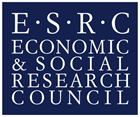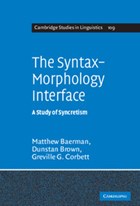'Possible words': The outer bounds of inflectional morphology
Project Overview
Project
'Possible words': The outer bounds of inflectional morphology
Project members:
Prof Greville G. Corbett
Period of award
July 2002 - June 2004
Funder:
Economic and Social Research Council (ESRC)
Speakers 'know' what a word is, yet linguists have said little about possible words. Words have different forms, such as give and giving, and these are normally related in predictable ways, in terms of meaning (semantics) and form (phonology). However, there are more complex cases. We find suppletion, where the meaning is regular but the forms are totally unrelated (go ~ went). Conversely we may expect different forms but find identical ones. Parallel to I gave and I have given, we find I brought and I have brought. The relation here is one of syncretism. Pairings of the type I write and I am writing can be found for almost any verb, but not: I must go and *I am go. This verb shows defectiveness. And deponency, an interesting, under-researched relation, indicates a form used with an unexpected, non-typical function. One further phenomenon belongs here, since it relates to all the other four, namely agreement. Here grammatical information attached to one word is relevant for another; the information is 'displaced'. This project examined in depth a sample of carefully chosen languages taken from different linguistic families (hence as diverse as possible), in order to establish the range of variation and the constraints on this variation.



